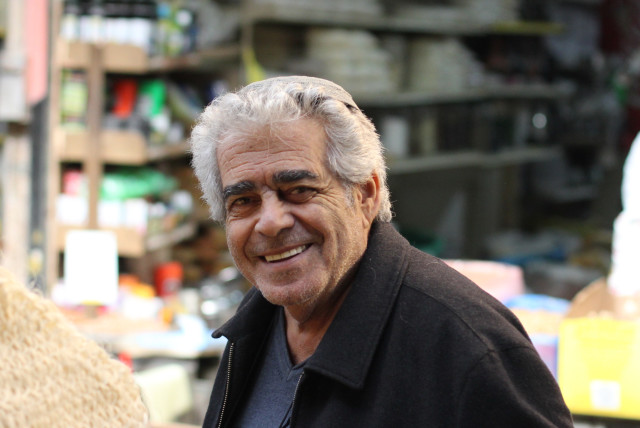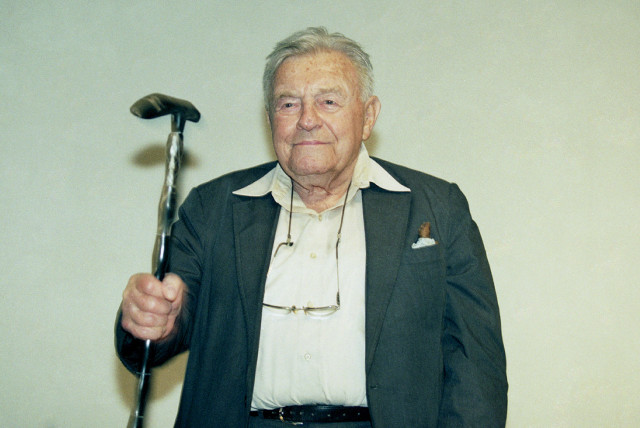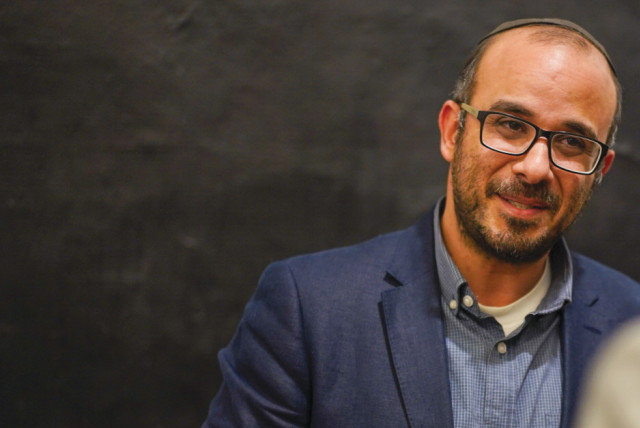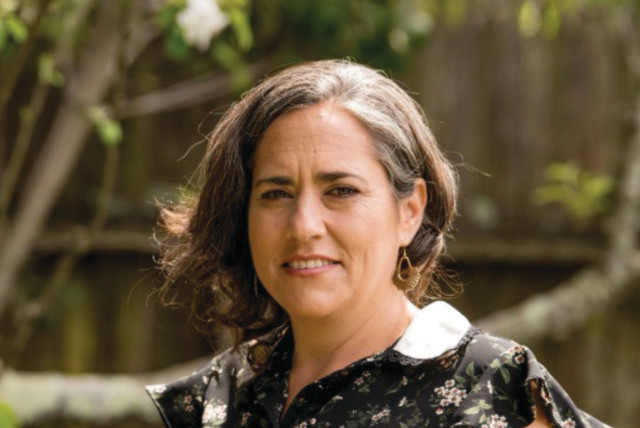Jerusalem Day: 10 iconic Israelis who called Jerusalem home
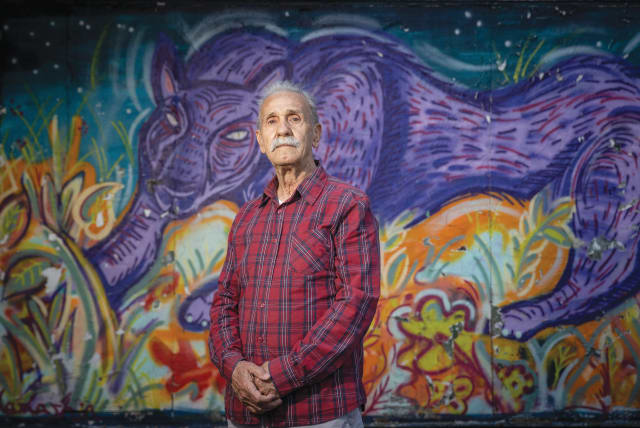
Some of the movers and shakers who lived in Israel's capital city.
ROBERT ABERGEL
Robert Reuven Abergel, one of the founders and leaders of the Black Panthers protest movement of the 1970s, was born in Morocco in 1942 and immigrated to Israel in 1950 directly to the underprivileged Jerusalem neighborhood of Musrara. In 1973, he withdrew from the Black Panther movement and became active in various left-wing organizations and social justice movements, such as Keshet Democratic Mizrahit.
Today, Abergel conducts tours in the Musrara neighborhood and continues his political involvement and social justice struggles, mainly through the Center for Alternative Information, which promotes Mizrachi dialogue with Palestinians.
URI AMEDI
“Where everyone sees abandonment, I see an opportunity for a new life,” says Uri Amedi, who turned two city neighborhoods – Nahlaot and Mahaneh Yehuda – into success stories.
As a neighborhood community center manager at the start of his career, he instituted a program based on the full involvement of the neighborhood residents concerning issues that affected their interests.
As a former municipality official in mayor Teddy Kollek’s administration, Amedi introduced many new concepts to the life of the city and its residents. It began in his childhood neighborhood, Nahlaot, where he promoted the idea of working together for the common good.
But his big breakthrough was in Mahaneh Yehuda, the market which, in the 1980s, was in such a bad state that the municipality had already started looking into the possibility of turning the entire area into a parking lot.
At the time, the market was a neglected, dirty place, full of tension, violence, drugs and criminal elements. Above all, it was a place of despair. At that time, shopping malls were being built, which attracted the public. The abandonment of the market worsened.
Amedi organized the merchants, involved the relevant municipal departments, and designed a physical rehabilitation plan with the merchants. The market began to change its face. But then came the big terror attacks – Mahaneh Yehuda was a favorite target – and it seemed that all was lost. People avoided the market, preferring alternative solutions.
In response to a horrific terror attack in the market at the beginning of 2000 during the Second Intifada, Amedi encouraged merchants to return to their stalls and not give up. At the same time, he insisted that the municipality and related bodies allocate substantial funds for the market’s physical rehabilitation.
From the depths of the inferno and destruction, a renovated Mahaneh Yehuda market began to rise – cleaner, more organized and accessible. Within a short time, it became a focal point for cultural and community life in the city and has even received international fame.
EFFIE BENAYA
Twenty-five years ago, Effie Benaya, CEO of the Confederation House, decided to fulfill a childhood dream. As a child of an Egyptian immigrant family – with memories of the great Egyptian singer Umm Kulthum and Lebanese singer and oud player Farid al-Atrash – he launched a festival that nobody expected: the oud in the classical Arabic tradition.
At the time, people thought that a festival of Arabic music had little chance of success, especially in Jerusalem, where it was felt that political tensions would deter the city’s Jewish population from attending the concerts. But Benaya was undeterred, and year after year he managed to run the festival during times of relative calm, as well as during the heightened tensions of the Second Intifada.
Over time, the Jerusalem International Oud Festival became a household name throughout the world. Prof. Taysir Elias, head of the Oriental Music Department at the Jerusalem Academy of Music and an oud player himself, organized the first festival with Benaya. Israeli Arab artists and renowned artists from around the world heard about the high-level festival artistic and agreed to participate.
Today, the festival is financed by the Culture Ministry, the Jerusalem Municipality and private foundations and has gained renown for its special atmosphere, both on the stage and in the audience. Arabs from the North and the Negev, as well as Arab residents in the eastern sector of the city, have enjoyed and praised the high quality of the festival and the cultural bridge that it has fostered.
Over the years, Benaya expanded the repertoire, introducing Indian, Greek, Spanish and Sicilian music. But the oud itself has remained the king of the festival, with most of the artistic program built around it.
SHIMON FUTTERMAN
Shimon Futterman, born in Jerusalem to a haredi family in the Mahaneh Yehuda area, is a train collector who owns models of various locomotives and wagons. These date from the last century and include train models from World War I and II, as well as vintage European and Middle Eastern trains. Over the years, he kept most of the collection in his home, which left him little room for conventional living.
Three years ago, Futterman was able to convince the mayor and the city’s deputy director of community affairs, Ariela Rejwan, to support an unusual project: preserving a century-old train wagon that arrived in Jerusalem in the last century and relocating it to the First Station. In the wagon, Futterman placed an elaborate system of toy trains, complete with appropriate scenery.
For Futterman, it’s almost all about trains. He has jewelry in the shape of trains, stamps, postcards from all over the world, key chains, train schedules, watches, pocket watches, badges, old currency bills with trains, and coins from 100 to 120 years ago.
Now a grandfather, his life still revolves around his passion for trains, as he shares his hobby with children. He believes that learning about trains, even if they are miniatures, can help young children learn about punctuality and attention to detail – and for a change, not have them spend hours staring at screens.
TEDDY KOLLEK
Theodor “Teddy” Kollek, mayor of Jerusalem from 1965 to 1993, was once called “the greatest builder of Jerusalem since Herod.” He was reelected five times; but at the age of 82, after reluctantly running for a seventh term in 1993, he lost to Ehud Olmert.
He worked for years with David Ben-Gurion before succeeding Mordechai Ish-Shalom as Jerusalem’s mayor in 1965. He said that Jerusalem is the heart of the Jewish people and history, and that a body can live without an arm or a leg, but not without the heart.
As mayor of a newly united Jerusalem in 1967, Kollek’s approach toward the Arab inhabitants was characterized by pragmatism. Within hours of the transfer of authority in Jerusalem, he arranged for milk to be provided to the city’s Arab children. During his tenure, he advocated religious tolerance and made numerous efforts to reach out to the Arab community.
Although he was adamant that Jerusalem should never again be divided and should remain under Israeli sovereignty, he believed that concessions should be made in a final settlement. He dedicated himself to many cultural endeavors, establishing the Jerusalem Foundation, which financed the projects. His prominent initiatives include the Israel Museum’s expansion, the Jerusalem Theatre, the Biblical Zoo, Teddy Stadium (named for him after his death) and Teddy Park, opposite the Hutzot Hayotzer artists’ colony (another of his initiatives).
Kollek endorsed a controversial government decision to evict long-time residents of the Yemin Moshe neighborhood, as the area was no longer a dangerous border neighborhood once the city was unified in 1967. Instead, he advocated settling the neighborhood, which overlooks the Old City walls, with artists, academics and writers.
But Kollek will always be remembered for the millions of dollars he raised from private donors for civic development projects and cultural programs, emphasizing that while Israel needed a strong army, it also needed expressions of culture and civilization.
Kollek died on January 2, 2007, and is buried at the Mount Herzl cemetery.
RAMI LEVY
Today the owner of the third-largest supermarket chain in the country, Rami Levy began his business career from a small family grocery store in the Mahaneh Yehuda market, called Hashikma Market. He refuses to close the store, saying that he did not want to forget where he came from.
He achieved his fame with the sales slogan “A chicken for a shekel,” which at first sounded like a kind of sting operation but turned out to be real, bringing him a multitude of satisfied customers. Later, his chain claimed to slash the price of the average basket of goods by as much as 20%.
In 2007, his company was listed on the Tel Aviv Stock Exchange. Since then, he has continued to increase the number of his stores. His ubiquitous branches are located throughout the country, as well as in areas over the Green Line, such as Beitar Illit, Gush Etzion, Sha’ar Binyamin, Ariel, and Mishor Adumim.
Levy’s stores are often cited as a model of Arab-Jewish coexistence, with Arabs and Jews shopping and working at his supermarkets side by side. Nevertheless, the Palestinian Authority has discouraged Arabs from shopping at Rami Levy supermarkets.
During Nir Barkat’s tenure as mayor (2008-2018), Levy was a member of the city council, as well as a deputy mayor.
RAMI OZERI
At the start of his career, Rami Ozeri set out to build a comfortable career in the field of economics. But at age 30, he felt something wasn’t right, and he pivoted to study art at the Bezalel Academy of Arts and Design. Although his studies filled him with a sense of satisfaction, he realized how much his religious Jewish tradition was not reflected in the educational environment.
He also soon realized that he did not want to be a creative artist and that the process of creation and production beckoned him more. He also realized that budding Israeli artists do not engage with their Jewish identity. He recalls that during class critiques, “If I brought something that dealt with Western philosophy, it was welcomed. But if I suggested something related to a Jewish figure, such as the Rambam or Yehuda Halevi, the reactions were negative. It was viewed as inappropriate,” says Ozeri, adding that the Ashkenazi, secular, leftist environment was very different from the traditional Spanish background in which he grew up.
Being older than the other students, with degrees in philosophy and economics already under his belt, Ozeri had enough self-confidence to leave Bezalel without completing his degree. He realized that instead of being a creative artist, he wanted to be an agent of art and culture – and perhaps more importantly, he wanted to bring his Jewish identity to his endeavors.
So in 2013, Ozeri set out to connect contemporary Jewish art content from all over the world with entrepreneurship, curation, management, production and writing. The result was the Jerusalem Biennale, a high-end art event hosted at several venues in the city. Within a decade, the Jerusalem Biennale has become an integral part of the capital’s cultural and artistic life.
The sixth Jerusalem Biennale will be held November 9 to December 28, 2023, on the theme “Iron Flock – Our Unassailable Assets.”
PROF. ALICE SHALVI
Jerusalem, a city with a largely Conservative and ultra-Orthodox population, is not perceived as being particularly open to feminism. Still, quite a few Jerusalemite women have advanced the status of women.
There is no doubt, however, that great accolade goes to Prof. Alice Shalvi who, despite being a member of an Orthodox community (which later became a Conservative community), managed to change the public discourse in the capital when it comes to women.
Shalvi was born in Germany and grew up in England, where she earned degrees in literature and social work. She made aliyah in 1949 and began teaching at the Hebrew University of Jerusalem.
In 1969, when she was denied the deanship of the English Department which she had created at Ben-Gurion University simply because she was a woman, she mobilized female faculty members to protest.
In 1975, she began running the Pelech School for Haredi Girls, earning the Education Ministry’s Education Prize in 1991 for such feminist initiatives as teaching Talmud to girls and insisting that alumnae serve in either the IDF or the National Service.
As founding chair of the Israeli Women’s Network, she also made significant strides for women’s rights, such as ensuring women’s participation in every branch of the IDF and encouraging more women to run for office.
In 2007, Shalvi was awarded the Israel Prize. Her memoir, Never a Native, won the National Jewish Book Award in 2019. Today, she is the president of Congregation Zion, created by one of her students, Rabba Tamar Elad, which combines Ashkenazi and Sephardi traditions in egalitarian prayer in the Baka neighborhood.
MARLYN VINIG
Marlyn Vinig does not fit into any conventional framework. A graduate of the Jerusalem Experimental High School, she became religious, together with her husband – her boyfriend from high school. Today, she is a Belzer Hassid, a mother of seven, and a grandmother, living in an ultra-Orthodox neighborhood. She is also a poet, with a PhD, who lectures on ultra-Orthodox cinema, having published two books on the subject.
She is a film critic of haredi cinema, a member of jury committees, and a sought-after lecturer, who is well known in the world of cinema and art in Europe. For Vinig, Jerusalem is first of all about love, which also includes mystical worlds, even utopian ones. She says it is a city that manages to evoke a constant longing and is firstly a spiritual city.
Although Vinig is immersed in the haredi-hassidic world, she has not cut herself off from the secular world; she even has a popular Facebook page. She actively participates in the cultural life of Jerusalem as a haredi woman, dressing modestly.
Currently, she is working on her first feature film, with the support of a generous grant from a German foundation. The film, naturally, will focus on an ultra-Orthodox woman making her way in Jerusalem.
YAEL YEHIELI
Yael Yehieli, a feminist activist from Jerusalem, launched the 50:50 project a few months ago. The project, which almost immediately garnered broad interest and support, calls for full equality in every public and political organization – that is, an equal balance of men and women.
Yehieli, who loves the city and is an active member of the Zion Congregation in Jerusalem, is married to Tomer and has two children – Ivri and Shiloh. From a very young age, she embraced feminism and fought for justice. “Inequality made me angry, but it wasn’t until I got older that I let it affect me,” she says.
Her two grandmothers influenced her, as both were working women and members of women’s organizations – one was a mechanical engineer, and the other was a political activist in the National Religious Party.
Yehieli explains the rationale behind the 50:50 project: 50:50 partnership and gender equality is the goal. Whereas currently, most decisions on budgets, infrastructures, education and so on are made by men only, such decisions should be made by men and women together.
This would be advantageous for all, not just women, stresses Yehieli. The biggest challenge, she says, is convincing people that what really matters is the body of people who make the decisions, so that both genders are represented equally.
Although women volunteer a lot, they often refrain from doing so in places where men are the primary decision makers, such as the city council. The biggest challenge, she says, is to make men understand that equality is good for men and women alike, not just for women.
Yehieli feels that success in this area would be realized when men and women contribute in equal measure to all decision-making.
“But,” adds Yehieli, “in the meantime, success in the local council elections in October 2023 would be an increase on the meager 16% of women who make up local authorities. In Jerusalem, for example, there are only six women on the city council.
“It can’t go on like this!” she laments. “Half of the city council is ultra-Orthodox, so there should also be ultra-Orthodox women on the city council.” (https://linktr.ee/5050il)
Jerusalem Post Store
`; document.getElementById("linkPremium").innerHTML = cont; var divWithLink = document.getElementById("premium-link"); if (divWithLink !== null && divWithLink !== 'undefined') { divWithLink.style.border = "solid 1px #cb0f3e"; divWithLink.style.textAlign = "center"; divWithLink.style.marginBottom = "15px"; divWithLink.style.marginTop = "15px"; divWithLink.style.width = "100%"; divWithLink.style.backgroundColor = "#122952"; divWithLink.style.color = "#ffffff"; divWithLink.style.lineHeight = "1.5"; } } (function (v, i) { });

